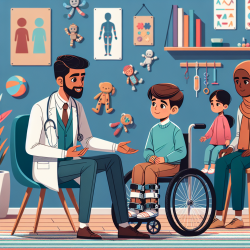Introduction
In the realm of healthcare, particularly mental healthcare for the elderly in rural America, challenges are abundant. The research article "Evaluating a community-based participatory research project for elderly mental healthcare in rural America" provides insightful findings that can guide practitioners in improving their collaborative skills and encourage further research. This blog explores the outcomes of this study and how they can be applied to enhance healthcare delivery.
Understanding the Research
The study focused on a community-based participatory research (CBPR) project called ElderLynk, which aimed to improve mental healthcare for the elderly in rural Missouri. The project highlighted the importance of collaboration between university researchers and clinical community partners. Sixteen collaborative partners were interviewed to assess the collaborative process across six critical domains. The findings revealed that while initial collaboration was top-down, greater community responsibility developed over time.
Key Findings and Their Implications
- Collaboration Development: The study found that collaboration in rural settings requires time and presence to build trust among partners. Practitioners should focus on establishing long-term relationships with community stakeholders to foster effective collaboration.
- Role of Community Partners: The research emphasized the need for community partners to have a significant role in defining research goals and activities. Practitioners should actively involve community members in decision-making processes to ensure their needs and perspectives are addressed.
- Sustainability Challenges: Sustainability was a major concern, as many grant-funded projects face challenges in maintaining operations post-funding. Practitioners should plan for sustainability from the project's inception, seeking alternative funding sources and community support.
Practical Steps for Practitioners
To implement the outcomes of this research, practitioners can take the following steps:
- Engage in Continuous Learning: Stay informed about the latest research and best practices in CBPR to enhance collaborative efforts.
- Build Strong Networks: Develop a network of community stakeholders, including healthcare providers, local organizations, and academic institutions, to support collaborative initiatives.
- Focus on Communication: Establish clear communication channels among partners to ensure transparency and alignment of goals.
- Plan for Sustainability: Identify potential funding sources and develop strategies to sustain the project beyond initial funding periods.
Encouraging Further Research
The findings of this study highlight the need for further research into effective collaboration models in rural healthcare settings. Practitioners are encouraged to explore innovative approaches to collaboration and share their findings with the broader healthcare community. By doing so, they can contribute to the development of sustainable and effective healthcare solutions for the elderly in rural areas.
To read the original research paper, please follow this link: Evaluating a community-based participatory research project for elderly mental healthcare in rural America.










